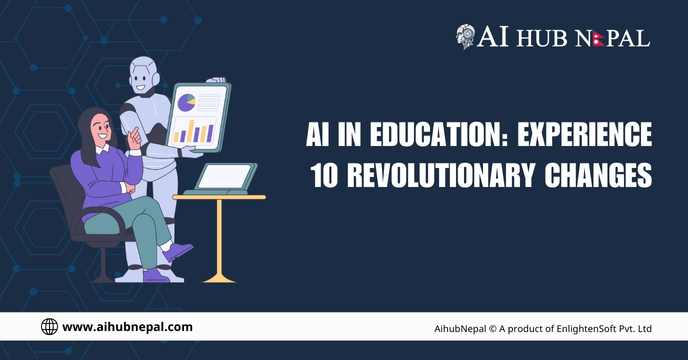
AI in Education: Experience 10 Revolutionary Changes
The fast development in artificial intelligence (AI) is causing a substantial change in the education sector. Traditional study techniques were beneficial but with time it is now being transformed by artificial intelligence (AI) technologies that provide individualized, effective, and captivating learning opportunities. AI has the potential to completely change the way we teach and learn, from intelligent tutoring systems and virtual classrooms to adaptive learning platforms. In this blog, we'll look at ten strong arguments for why artificial intelligence (AI) will transform conventional study techniques and bring in a new era of inclusive, easily available education that is individualized for each student. We will also look at some actual instances of artificial intelligence in the classroom.
10 Reasons to Use AI in Education
1. Personalized Learning:
With the help of AI, educators may customize learning experiences for each student based on their specific requirements, strengths, and weaknesses. By giving students the appropriate information at the correct time, this individualized approach improves retention and understanding. Artificial intelligence (AI) can recognize the subjects that a student finds difficult and recommend extra materials or practice questions through adaptive learning platforms. Students proceed at their own pace with the support of this personalized learning route, which lowers frustration and increases confidence. Students' learning efficiency will also be maximized as they concentrate on areas that require improvement rather than spending as much time on subjects they have learned.
2. Intelligent Tutoring Systems:
Students can benefit from one-on-one training via AI-powered tutoring systems, which is similar to having a personal tutor without having to pay high costs. Intelligent tutoring systems can modify their teaching methods in response to student's understanding. It also assists students through challenging courses and offers on-demand explanations and real-time question responses. These systems provide immediate, individualized feedback to help students quickly discover and address problems. They can also adjust to a student's preferred learning method, making complex subjects more approachable and interesting.
3. Enhanced Engagement:
Textbooks don't have to be the only source of knowledge. With the help of immersive and interactive learning environments made possible by virtual reality (VR) and augmented reality (AR), artificial intelligence (AI) can bring complex concepts to life. AI can turn courses into exciting excursions for pupils by combining VR and AR. For example, history classes can be transformed into virtual excursions to historical civilizations, enhancing the learning experience and creating lasting memories.
4. Automated Grading and Assessment:
By automating the grading process, artificial intelligence (AI) can save teachers time and give students immediate feedback. Write-ups, essays, and even programming projects can be graded using automated grading systems. Students benefit from instant feedback to recognize their errors and improve their performance whereas teachers can concentrate more on instructional activities as a result of this efficiency.
5. Data-Driven Insights:
Large volumes of educational data can be analyzed by AI to find trends and patterns, assisting educators in making wise judgments. By utilizing data analytics, artificial intelligence (AI) may detect patterns in student behavior, attendance, engagement, and even facial expressions to pinpoint areas of difficulty and learning gaps. By using this information, educators may better address the needs of their pupils, recognize students who are at risk, and modify their teaching methods.
6. Virtual Classrooms:
AI makes it easier to create virtual classrooms, which increases flexibility and accessibility in education. AI-powered virtual classrooms can provide real-time communication, group projects, and access to a worldwide network of experts and peers. Due to this flexibility, students can learn from any location, overcoming schedule conflicts and geographical constraints.
7. Language Translation and Learning:
It can be difficult to learn a new language. AI's real-time translation and language learning assistance can help people overcome language hurdles. AI-powered translation solutions promote inclusive learning environments by assisting students in understanding content written in several languages. Additionally, AI is used by language learning apps to deliver conversational practice, adaptive learning activities, pronunciation guidance, and personalized courses tailored to your language goals.
8. Accessibility and Inclusivity:
AI ensures equal learning chances for students with disabilities by bridging the gap. AI can offer assistive technologies like real-time captioning, text-to-speech, and speech-to-text. With the aid of these resources, students who struggle with hearing, seeing, or learning can interact with the material more successfully.
9. Content Curation and Organization:
Online material might be overwhelming to sort through. Based on your interests and learning goals, AI can select individualized course materials for you. Imagine having a virtual research assistant who looks for materials, videos, and articles that are relevant to your needs.
10. Continuous Improvement
AI is ever-learning and always changing. It has the capacity to learn and grow over time, providing greater resources and instructional tools. AI algorithms get increasingly precise and efficient as they process more information and get input from users. Due to this constant advancement, educational materials and tools are always changing and offering both instructors and students the latest solutions.
Practical Applications of Artificial Intelligence in Education
AI applications in education are changing the way students learn by providing a customized, adaptable learning environment based on their needs and skills. Here are a few examples of well-known international businesses and IT consulting firms merging education with AI to produce innovative and user-friendly AI-based applications:
-
Google
One well-known technology that uses AI to streamline several aspects of education is Google Classroom. It enables educators to plan and offer assignments, provide feedback, and manage classroom behavior with effectiveness. The artificial intelligence (AI) algorithms in Google Classroom can facilitate automatic grading, offer personalized learning material recommendations, and analyze student data to offer insights on progress and performance.
Google Scholar and Translate are two extremely useful tools that improve teaching and learning for both educators and students. Language boundaries are no longer an issue due to Google Translate, which offers spoken language translations as well as rapid text and website translations.
In the meantime, Google Scholar makes it simpler for students, researchers, and educators to locate trustworthy and relevant sources for their studies by using AI algorithms to evaluate and index academic resources, research papers, and scholarly publications.
-
Duolingo
With AI, the popular language-learning program Duolingo creates adaptable language lessons. AI programs track students' progress, identify areas for improvement, and alter the course material as required.
To assist language learners in improving their skills, the app provides interactive exams, vocabulary drills, and tailored lessons. AI also supports the production of engaging content, speech recognition, and pronunciation feedback to facilitate effective language learning.
-
Coursera
Coursera is redefining online learning by using AI. Students can obtain customized recommendations and fast feedback through automated exams, adaptive learning paths, and personalized course recommendations.
The AI algorithms examine student preferences and performance data to make relevant course recommendations, modify course content dynamically in response to learners' advancement, and offer immediate grading and feedback. With the help of these AI-powered features, online learning becomes more engaging and produces better results.
-
Quizlet
Quizlet is a global American firm that offers learning and study tools. Through its adaptive learning platform, Quizlet utilizes AI to improve the study experience. Personalized study plans are generated by the AI-powered "Learn" mode, which determines which ideas pupils already understand and which ones require more attention.
By modifying the level of difficulty and question kinds in response to user performance, this educational tool guarantees productive and successful study sessions. To make studying more interesting and customized to each student's needs, Quizlet also uses AI to create interactive notes and practice exams.
-
Squirrel AI
The first multinational provider of educational technology, Squirrel AI offers large-scale, AI-powered adaptive learning solutions that allow for real-time personalization of education. Through regular assessment of student knowledge and learning habits, Squirrel AI modifies assignments and lessons to each student's level and pace by continuously evaluating their learning habits and knowledge.
The platform helps students become more proficient in a variety of courses by predicting learning outcomes and identifying knowledge gaps. Furthermore, Squirrel AI gives instructors comprehensive insights into their students' development, allowing for more individualized and efficient instruction.
The Future of AI in Education
AI in education has a revolutionary future. Technology has the power to completely transform the education system, altering conventional teaching strategies and opening the door to a future driven by technology. AI solutions for education analyze massive data sets with complex algorithms as we move toward a society that is increasingly technologically advanced, offering individualized and flexible learning experiences. In education, students benefit from instant feedback, tailored learning, and immersive technology like virtual and augmented reality.
Additionally, conversational AI in education provides intelligent tutoring and instant support, encouraging self-directed learning by closely monitoring the way students consume content and adapting to meet their needs. With the use of this technology, corporate training and remote learning are made possible, enabling students to manage their academic obligations alongside their personal and professional lives. Without a doubt, AI trends accelerate growth by improving student engagement through personalized learning, interactive lectures, and gamified classrooms.
